Search
Showing 10 of 525 results for group registration
-
NZ-GRADS scholars come together at annual science meeting
The NZ-GRADS programme awards scholarships to students from developing countries who are passionate about researching topics related to greenhouse gas emissions from agriculture systems, primarily livestock. The scholarship programme is funded by MPI and managed by Education New Zealand Manapou ki te Ao (ENZ).
The seven scholars were supported to travel to Wellington by MPI, while ENZ organized the travel and scholar engagement for the day. This event not only allowed scholars the opportunity to hear cutting-edge research relevant to their own fields, but to also to connect with each other, and fellow scholars and researchers. The scholars are currently studying towards their PhDs across the motu at the University of Auckland, Massey University, the University of Waikato, the University of Otago and Lincoln University.
ENZ Director Scholarships Carla Rey Vesquez said getting the scholars together in-person enabled lively discussion between the scholars and attendees.
“I was delighted to witness the excitement and ideas emerging from the conversations. The NZ GRADS scholars are a vibrant group of people dedicated to creating a greener future both in New Zealand and back home.
“Attending in-person was critical in cementing their understandings of research in their own fields and the wider science community in New Zealand,” she added.
The event was very well received by scholars, with Kirill Bogdanov commenting “this was an excellent experience to be around people who support science and especially listen to the questions they asked - it is valuable to know what the investors expect from your research.”
“New Zealand is giving me a marvellous opportunity to perform high-quality research, communicate with interesting people, and be on my own adventure in a land far, far away,” he added.
-
New brand identity of the Manaaki New Zealand Scholarship Programme launching next week
Education providers and suppliers who are part of the programme will be able to start using the new brand’s design assets from The ENZ BrandLab from 23 October.
The Manaaki New Zealand Scholarship website will also prominently showcase the refreshed brand from next week.

The new Manaaki logo consists of three parts. The tohu is on the left, the Manaaki wordmark is placed in the middle, with the Aotearoa New Zealand fernmark on the right-hand side.
New Zealand Ministry of Foreign Affairs and Trade - Manatū Aorere (MFAT) Scholarships Unit Manager, Alexandra Grace, said it was important for the new brand identity to reflect the transformational nature of Manaaki scholarships to build people’s skills and support them to contribute positively to their communities and countries.
“The new brand is an exciting step forward to unify the Manaaki New Zealand Scholarship Programme’s visual identity to appeal to prospective scholars who are most aligned with our Programme’s values,” Alexandra said.

He parirau is one of the key patterns of the new brand. It is inspired by the takarangi (spiral) and parirau (feathers).
The brand identity development and working group involved kaimahi Māori from MFAT, Education New Zealand Manapou ki te Ao and Indigenous Design Innovation Aotearoa (IDIA) who gifted a specially crafted whakatauākī* for the Manaaki New Zealand Scholarship Programme.
The whakatauākī ‘He Parirau Toro Ao’ translates to ‘stretch your wings to the world’.
ENZ’s Senior Advisor, Rautaki Māori, Craig Rofe, said the whakatauākī is a profound taonga and gift to the Manaaki New Zealand Scholarship Programme.
“It beautifully anchors the programme in āhua Māori (Māori ways of being).”
“We are also pleased with how the whole process of creating the new brand has been steeped in āhua Māori. The way everyone involved in the project used whakawhanaungatanga – the specific act of getting to know one another before we started our work – and wānanga, coming together to meet, discuss and deliberate, every step of the way, made all the difference,” Craig said.


Digital banners showing the application of the brand and whakatauākī.
The new brand was developed following research and interviews with 29 scholars and alumni, and a survey covering 627 people.
The research surfaced three compelling principles for the Manaaki New Zealand Scholarship Programme – manaakitanga, empowering people, communities and countries, and fostering enduring connections.
ENZ’s Manaaki Scholarships Manager, Nancy Linton, said the concept of manaakitanga is integral to the Manaaki New Zealand Scholarships Programme – not only by name, but also in the way that scholars are supported during their entire journey, from application and study to their return home.
“The manaaki we show our visitors by embracing them like part of our ‘whānau’ or family is visible in the way our educational providers extend that support to Manaaki scholars and alumni, who really value it as part of their study experience.
“I am pleased with the way we have incorporated this core element of the Programme, among others, into the new brand identity,” Nancy said.
A brand transition period is in place through 28 February 2025, to allow providers enough time to switch to new brand assets.
Visit The ENZ BrandLab to access new design assets for the Manaaki New Zealand Scholarship Programme after 24 October.
* Whakatauākī are proverbs where the person who said it first is known, as opposed to whakataukī, which are proverbs whose origin cannot be traced to a person.
-
NZ forges fruitful partnership with Paraná state, Brazil’s education powerhouse
Following a visit to New Zealand universities in September by a delegation of authorities from Paraná state, Brazil, the Latin America Centre of Asia-Pacific Excellence organised a reciprocal trip for a group of New Zealand educational representatives to go to Curitiba, Paraná’s capital city. The purpose of the visit was for the New Zealand delegation to get a closer look at the research structure of this southern Brazilian state and discuss future pathways for collaboration between Brazilian and New Zealand students and researchers.
The public higher education system of Paraná is made up of seven state universities and three federal institutions spread across several cities, with in-person and distance learning. They are quality research and teaching institutions, with substantial scientific production capacity and academic prestige. Paraná state has a population of roughly 11 million people.

New Zealand delegation meets with representatives of the State Secretariat for Science, Technology and Higher Education of Paraná and deans of state universities.
During the meetings in the capital of Paraná, held in mid-October, there were several discussions with deans and vice-deans of state universities, representatives of the State Secretariat for Science, Technology and Higher Education and the Araucária Foundation, a state-funded institution that focuses on promoting high-level scientific research.

New Zealand delegation at the Araucária Foundation, which funds scientific research
The meetings were attended by Secretary Aldo Nelson Bona and his team; market development manager of Education New Zealand Manapou ki te Ao (ENZ) in Brazil, Bruna de Natale; Nicole Freeman, from the Latin America Centre of Asia-Pacific Excellence; as well as representatives from 3 of the 8 New Zealand universities: Frank Bloomfield, from The University of Auckland, Leonel Alvarado, from Massey University and Jannik Haas, from the University of Canterbury.
Frank Bloomfield is deputy Vice-Chancellor, Research and Innovation at the University of Auckland. During the visit he highlighted the importance of collaborating internationally with other universities to undertake research and how one cannot conduct research in your own country alone.
"I’ve had the pleasure of leading two delegations to Brazil this year. Firstly, in April for the Faubai conference, when we also had the opportunity to talk to some professors from leading Brazilian universities. And now this visit.
“Despite our differing geographic and population sizes, the research priorities of our countries are very similar. We have heard from our colleagues here in Brazil that we have similar priorities but also similar problems,” said Frank.
“An example of this is in agriculture and how we need to think about using new techniques and new technologies such as genomics to improve our productivity in agriculture. This also applies to a whole host of different areas in which our priorities are similar including freshwater and culture, engineering, and chemical sciences, for example,” added Frank.”
-
Update from Immigration NZ
Improving how Immigration New Zealand processes Student Visa applications
You may be aware that Immigration New Zealand (INZ) will move student visa applications onto its enhanced Immigration Online platform in the second half of 2025.
As part of this work, INZ is designing ways to improve the experience of applicants by:
- making it clearer which type of student visa to apply for
- improving information on the evidence requirements (especially financial evidence and demonstrating genuine, or bona fide intentions) and
- improving visibility of the progress of applications.
After initial designs are developed, INZ will test these with a group of students and nominees from education provider peak bodies that include:
- Universities New Zealand
- Te Pūkenga
- Schools International Education Business Association (SIEBA)
- Independent Schools NZ (ISNZ)
- Independent Tertiary Education New Zealand (ITENZ)
- Quality Tertiary Institutions (QTI)
- English New Zealand (Private and University English Language Colleges)
This work is centred around ways customers apply for student visas, and how INZ processes these. Substantive policy change is not part of this work.
INZ's focus is on implementing key improvements for students and the sector and ensuring a successful transition to its enhanced Immigration Online platform.
-
Winners of KIWI Challenge announced
This year was the first where university students were able to enter a new category alongside the schools' challenge.
The winning teams from Petra Christian University and USG Education headed off strong competition from eight other finalists, drawing praise from the judges for their solutions to support youth-led Small and Medium Enterprises (SMEs).
Finalists presented to a panel of judges from University of Otago – Ōtākou Whakaihu Waka and Education New Zealand Manapou ki te Ao (ENZ), who were cohosting the initiative.
Both winning teams received a voucher valued at 10,000,000 Indonesian Rupiah (approximately 1,000NZD) as well as virtual internships from the University of Otago – Ōtākou Whakaihu Waka commencing in semester one, 2025.
Tech-led solutions
A team from Petra Christian University developed an app ‘Partify’ which connects emerging small businesses and keen part-time workers. Businesses post part-time jobs, and workers swipe to find flexible gigs nearby, with AI matching candidates based on skills, location, and availability.

Partify university winner – ENZ market manager Naluri Bella and University of Otago Regional Market Manager Sarah Ewing present the award for First Place in the University category to team members from Petra Christian University for their app ‘Partify’.
In the high school category, a team from USG Education took the top prize with ‘LAW4MSME’, a platform allowing small businesses to access legal information and advice.
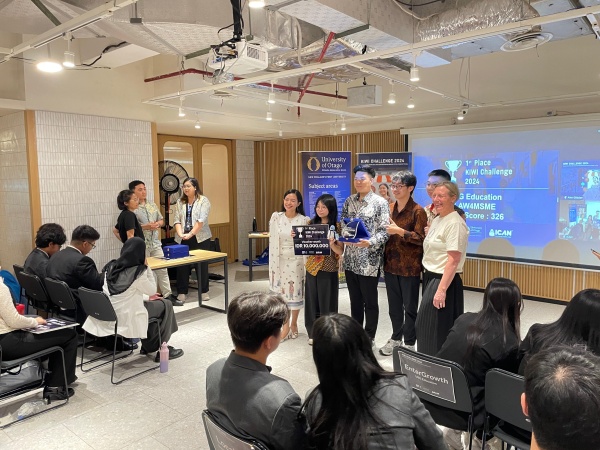
LAW4MSME High school winner - ENZ market manager Naluri Bella and University of Otago Regional Market Manager Sarah Ewing present the award for First Place in the University category to team members from USG Education for their platform “LAW4MSME’.
Explaining the group’s business idea, team leader for LAW4MSME, David Francis said the students found that Indonesian youth-led SMEs lack knowledge of the laws and regulations needed to run their businesses.
“To address this, we developed an AI bot that educates SME owners on these regulations, helping them navigate legal requirements more effectively,” David said.
The KIWI Challenge competition aims to inspire youth across Indonesia to engage in entrepreneurial activities and help resolve societal issues. Over the five years the competition has run, 1000 Indonesian youth have participated. This year, Education New Zealand Manapou ki te Ao (ENZ) partnered with University of Otago to co-host the initiative.
This year’s competition included 49 teams with a total of 221 student participants.
Mentorship key
Mentorship is a key element of the competition. The finalists attended a workshop run by Associate Professor Dr Conor O’Kane, Head of the Bachelor of Entrepreneurship programme at Otago Business School. This assisted entrants to develop their ideas and refine business plans.
ENZ Acting General Manager International Ben Burrowes said he’s delighted to see the continued development of the KIWI Challenge.
“Inviting university students for the first time has given us the opportunity to include a whole new cohort of talented young entrepreneurs, and we have been very impressed with the quality and creativity of their submissions,” Ben said.
“The competition has also benefitted from the enthusiasm and expertise of our colleagues at the University of Otago, and we are grateful for their willingness to partner with us for the KIWI challenge’s fifth year.”
Dr O’Kane said it was inspiring to witness the quality of entrepreneurial thinking among Indonesian students.
“These students have very bright futures. The concepts and programmes the finalists presented were remarkable and captured the impressive ability of the teams to identify tangible business problems and visualise and communicate a solution to these challenges,” Dr O’Kane said.
-
From the CE: Accountability and balance
ENZ has experienced a challenging operating environment in recent years, and it continues to work through changing expectations. In order to best prepare the organisation for the challenges ahead, I recently initiated an organisational restructure, the decisions of which were released to staff this week following a two-week consultation process.
I have been very clear as to what I am looking to achieve and have set out the following driving principles of:
- Clear accountability for the delivery of core services and enabling support.
- Achieving a balance between New Zealand based and offshore capability.
- Improving decision making, communication and collaboration by ensuring appropriate spans of control.
- Optimising spend, where appropriate, to meet government expectations.
- Identifying and creating opportunities for investment into the future capability needed to deliver our strategy.
- Positioning ENZ to deliver at speed, with agility and reinforce a culture of high performance.
Key changes include a realignment and reduction of Senior Leadership roles by more than half, a focus on lifting the capability and resourcing of our international teams, changes for Sector Engagement and Services with a pivot toward a stronger focus on international services, and the creation of a Strategy, Capability and Performance Group. In total 28 roles have been disestablished with 17 new roles created.
ENZ now moves into a process to fill these new roles – with leadership roles to be advertised externally shortly. The new organisational structure will come into effect on 3 February 2025.
Change is never easy and I understand how difficult this has been for our ENZ team. I am very proud of the professional way everyone has engaged with this process.
I appreciate your understanding and patience for our people as we work through the implementation of this new structure. In the meantime, your key contacts and teams will remain the same. I will be able to provide a further update in the New Year.
He taonga rongonui te aroha ki te tangata
Kindness to all people is a great treasure.
Ngā mihi nui,
Amanda Malu
Chief Executive
Education New Zealand Manapou ki te Ao -
Hundreds of Brazilian high school students arrive at New Zealand schools
Over January and February, 200 students from Paraná and 100 from São Paulo arrived in New Zealand on a Brazilian state-funded scholarship that will have them spending a semester and term in New Zealand schools while staying with host families.
Chosen for their academic performance, attendance, and completion of an English course, these top students get a chance to immerse themselves in New Zealand's education system and culture.
New Zealand is considered a strategic partner by Paraná state and São Paulo. This programme highlights the success of increased educational cooperation between Brazil and New Zealand. In addition to improving English proficiency, the initiative also aims to develop intercultural skills.
Paraná's programme, launched in 2019, has sent 1,240 students to various countries, with more than 600 going to New Zealand.
Coordinator of the São Paulo programme, Simone Telles, said New Zealand was chosen for this programme due to our innovative education system, use of technology, the freedom given to students and the welcoming nature of New Zealanders.
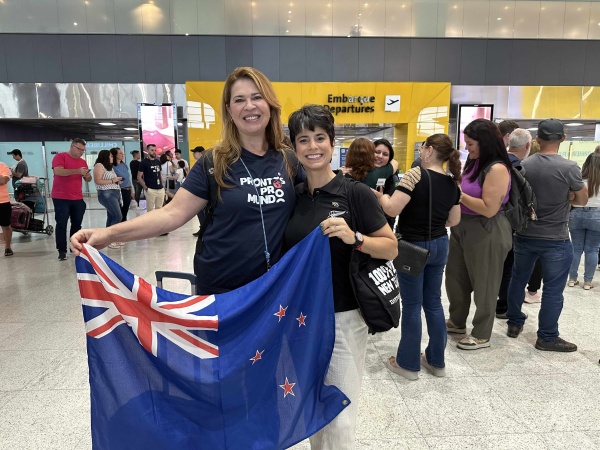
Simone Telles and ENZ’s Market Development Manager, Bruna de Natale: Education partnership between São Paulo and New Zealand.
In São Paulo, ENZ Market Development Manager, Bruna de Natale, attended one of the departure days for the group traveling to New Zealand. Bruna spoke to Luciangela Fonseca, mother of one of the selected students, Juan Fonseca. Luciangela said she felt “pride mixed with fear and emotion” and that the family felt privileged to get this opportunity.
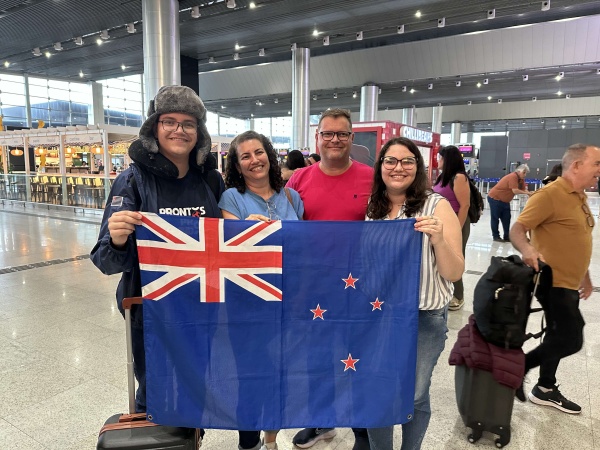
Juan Fonseca, his parents, and sister. Emotions at the departure for Auckland.
All programme costs are funded by Brazilian states, including transportation, education, food, accommodation, and leisure activities.
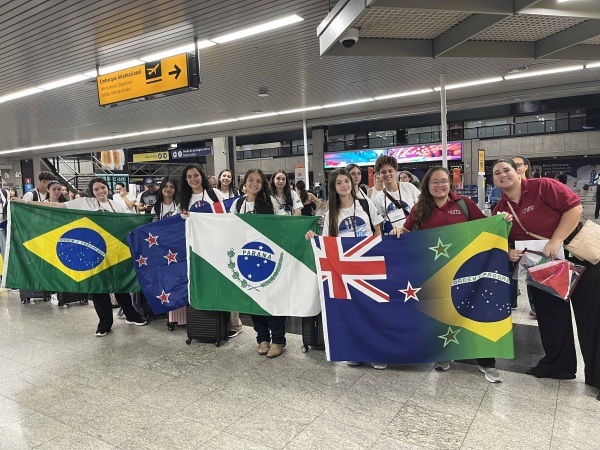
Paraná students departing in São Paulo.
-
Immigration New Zealand update
India delegation
Alison McDonald, Head of Immigration, joined ENZ Chief Executive Amanda Malu as part of the Prime Minister’s official delegation to India. Celia Coombes, Director Visa at Immigration New Zealand, responsible for the student visa product, joined Amanda and Ben Burrowes in India afterwards where they supported the New Zealand delegation at the Asia Pacific Association for International Education (APAIE) and met with the New Zealand Education Representatives in India (NZERI), a group of Indian education agents.
“Immigration New Zealand found the trip very valuable and insightful,” says Celia.
“Now we are working on how we can continue to support the growth of the education sector, particularly in India which is such an important market for New Zealand, and what needs to be done to support more applications being approved.”
New local points of contact in India and China
Immigration New Zealand has new Engagement Advisors appointed in New Delhi and Beijing. They will be a local point of contact and working to improve communication within both the education and tourism industry.
Visa processing
INZ is in a strong position for processing student visas, following initiatives put in place to make our processing more efficient. At the end of March 2025, international student visas were being decided in 10 days (two weeks) on average.
On average Te Pūkenga (New Zealand Institute of Skills and Technology) applications are being processed within 2.5 weeks, 2 weeks for University applications, 3 weeks for Private Training Establishment applications and 1.5 weeks for school applications.
INZ have already decided more than 20,500 student visa applications so far this year, and approved around 18,000 student visa applications (from 1 Jan – 31 March 2025).
To help with faster visa processing, it is key that all the information and documents needed to decide the application is provided. All the details can be found on our information sheet for students on the INZ website: Student visa information | Immigration New Zealand.
-
Successful agent engagement and student recruitment drive in Malaysia
The events aimed to gauge student interest in studying in New Zealand and deepen collaboration with education agents and schools.
To kick off the series, in early March, ENZ and representatives from New Zealand universities co-hosted a morning tea information session and focus group for Malaysian education agents in Kuala Lumpur.
The session promoted the ENZ resources available to support agents, and representatives from University of Auckland, University of Canterbury, Massey University, University of Otago, and University of Waikato led a discussion exploring key messages that resonate with Malaysian students and parents, understanding the factors influencing destination choice and brainstorming strategies to strengthen New Zealand’s brand visibility.
The event brought together 11 agencies from across Kuala Lumpur.
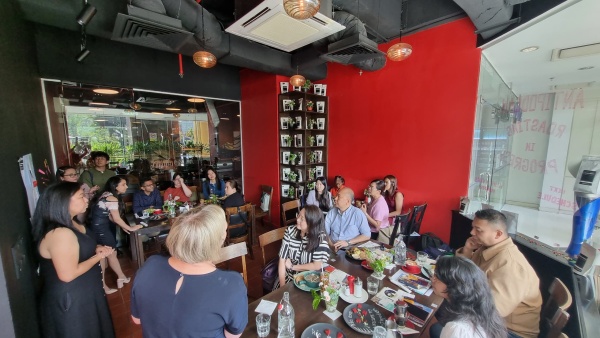
Co-funded agent activity
ENZ supported three key education agencies from across Malaysia to undertake co-funded student recruitment activity.
In Selangor, AECC Global Malaysia and ENZ hosted a mini-booth fair at HELP International School – giving students the opportunity to interact directly with representatives from Auckland University of Technology, the University of Auckland, the University of Canterbury, University of Otago, and the University of Waikato.
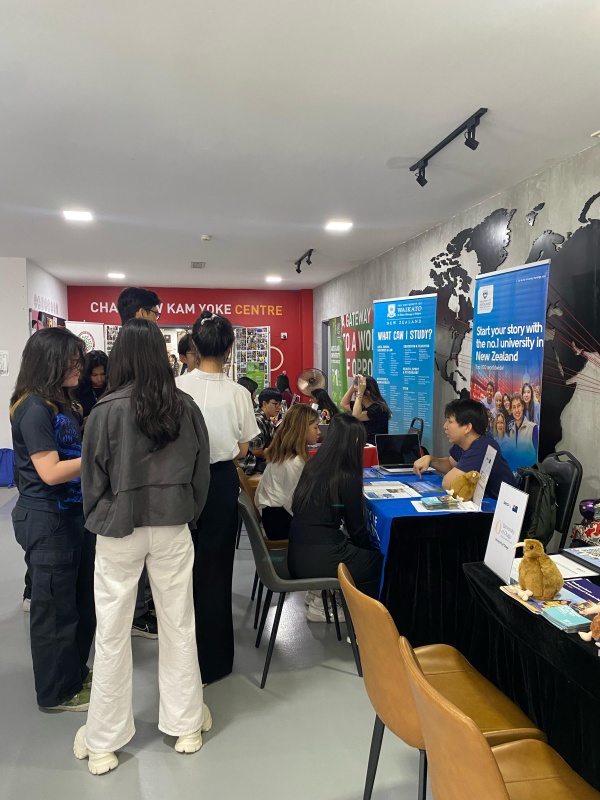
The mini-booth fair at HELP International School.
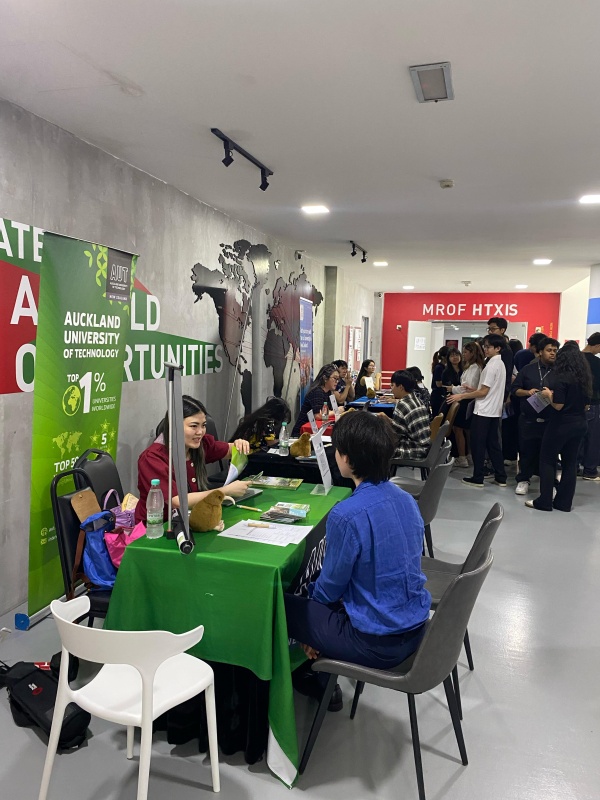
The mini-booth fair at HELP International School.
Over to Shah Alam, SELSET Education partnered with INTEC College to host an information session showcasing eight of New Zealand’s tertiary institutions.
INTEC College students heard from the Auckland University of Technology, the University of Auckland, University of Canterbury, University of Otago, University of Waikato, Southern Institute of Technology, Nelson Marlborough Institute of Technology and pathway provider, University of Canterbury International College.
Around 100 students were in attendance, and the session was followed by an opportunity for students to chat further with the study providers on show.
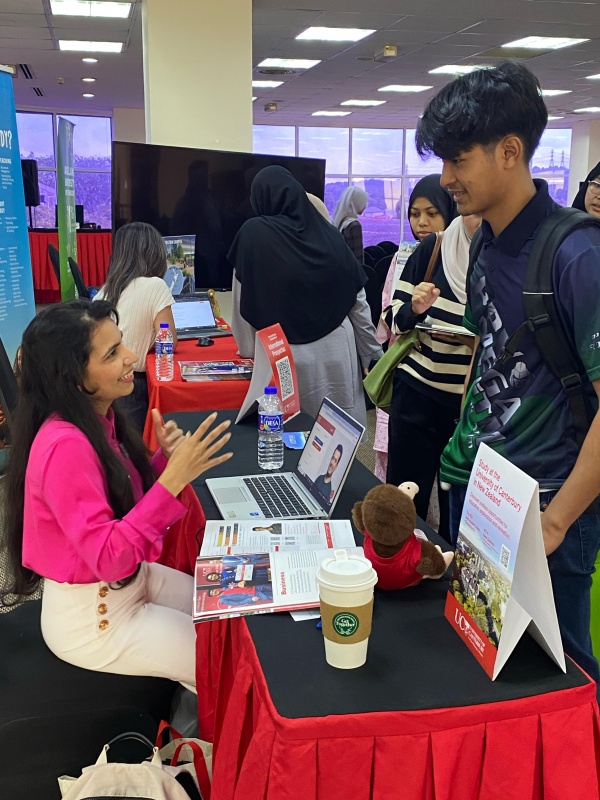
Students at INTEC College exploring New Zealand tertiary education study options.
To close out the co-funded activity, ENZ made its first official visit to East Malaysia since before the pandemic.
ENZ and JM Education partnered to lead a series of school visits in late April Kota Kinabalu, Sabah.
Around 400 students attended information sessions across three schools. The events were led by the University of Auckland and University of Otago at Kota Kinabalu High School, Sekolah Menengah Sains Sabah, and Maktab Nasional.
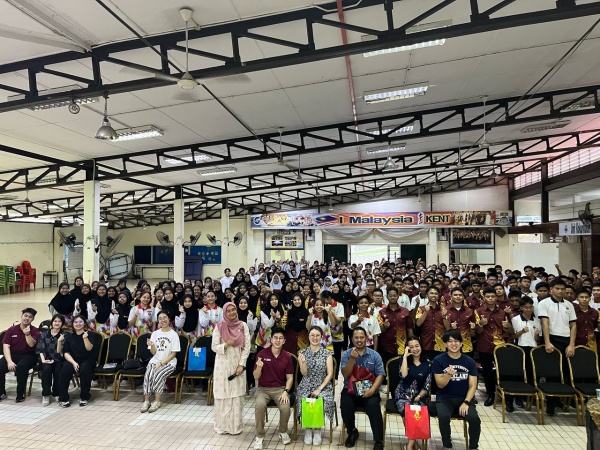
Attendees of one of the information sessions.
ENZ Market Manager for Indonesia and Malaysia, Naluri Bella, said that partnering with agents for co-funding targeted activities helps enhance both agents and students’ awareness and understanding of New Zealand’s unique education offering.
“These collaborations not only build trust and commitment among agents but also positions New Zealand as a competitive and credible choice for Malaysian students,” she said.
-
Felix Loh: kūwaha a symbol of enduring ties to New Zealand
Now chief executive of the stunning and expansive botanical attraction that is Singapore’s Gardens by the Bay, Felix is delighted that it was selected as the site for a Māori kūwaha, or carved doorway, which feels personally symbolic to him.
Recently unveiled by Prime Minister Jacinda Ardern, the kūwaha celebrates the long-standing friendship between Aotearoa New Zealand and Singapore. “New Zealand has a special place in my heart, and I am honoured to host this precious Māori artefact. I hope the kūwaha will be a symbol of our friendship for many years to come.”
New Zealand now feels like a second home to Felix, but he shocked his parents and perplexed the scholarship selection committee back in 1988 when he told them he wanted to study horticulture at Massey University.
“I knew that Massey was well-known as an agricultural centre of excellence, and that horticulture was a very popular course,” he says. “But they were puzzled and asked me why I wanted to be a farmer in an urban city state like Singapore.
“My Dad did not speak to me for a few years, because Asians all want their kids to be lawyers, engineers, and doctors, and I chose to be a plant doctor instead. But I never regretted that decision.”
Felix says he felt welcome from the moment he arrived in New Zealand and enjoyed his four years as an international student so much he would have stayed on if he could. But the terms of his scholarship meant he needed to return to Singapore.
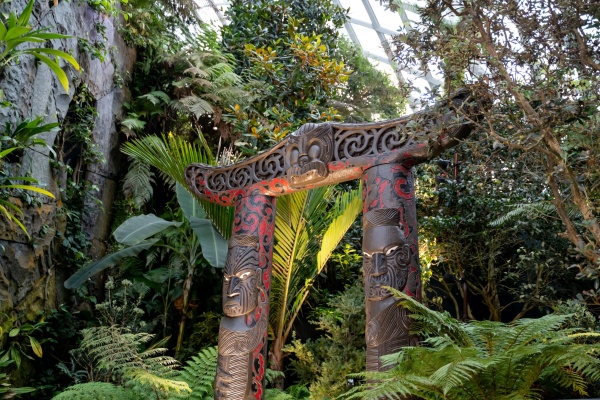
The Māori kūwaha recently unveiled at Gardens by the Bay.
No such thing as a stupid question
A less formal approach to education, with an emphasis on inquiry and collaborative learning, proved an initial challenge for Felix but ended up being one of the reasons he rates his New Zealand education experience so highly.
“At my first class we were told that we were expected to ask questions. This was the first time that I heard the phrase ‘there’s no such thing as a stupid question’,” he says. “That shook me, because in Singapore in those days nobody answered a question in class unless they were sure they had the right answer. For the first time, someone was willing to explore an alternative point of view.”
He turned up to English classes thinking it would simply be language tuition but discovered it was all about writing for your audience, with essays to be critiqued by classmates. “I initially questioned why fellow students would judge my work, but I quickly understood the value in taking on board a diversity of views to refine an idea or get a better product.”
And group project work certainly provided a life lesson for Felix, who had been conditioned to individual success based on exam results. “Not only did we have to work in groups, but we couldn’t choose our project partners,” he says.
“I’ll never forget the lecturer telling us that when we get to the workplace, we cannot choose our boss or even our colleagues, so we need to be able to work with different people. I learned that New Zealanders place people at the centre of what they do, and that we need to learn to appreciate the input of others.”
“I learned that New Zealanders place people at the centre of what they do”
Felix says his New Zealand education set him up for life-long learning which has helped to drive his career success. “You’ve got to learn and unlearn throughout your whole lifetime. It’s not so much about the content, but about being curious and knowing where to go for the answers.”
Friendships lead to enduring ties
It is through the people he met that he has forged an enduring relationship with New Zealand. Fellow churchgoers and schoolmates became life-long friends and “a moral and emotional support base” over the years. He has returned to New Zealand many times and stays in touch with former lecturers and teaching staff, some of whom are now plant suppliers for him in his role at Gardens by the Bay.
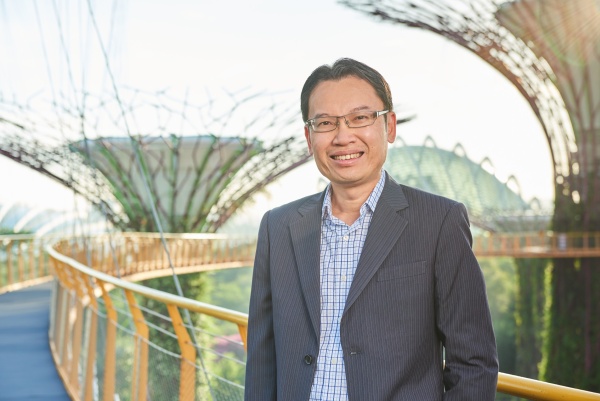
Felix at Gardens by the Bay.
“When I took on this job, one of my first trips was to go back to New Zealand to source new plants for our temperate Flower Dome. I visited a number of nurseries, just knocking on their doors, and I was made to feel so welcome. It just felt like I was at home.”
The world is a very different place from what it was in the 1990s, but Felix says the value of international education remains as important as ever.
“International education helps us to understand other perspectives better and demystify misconceptions we have about each other.
“In today’s uncertain world it is always good to have friends in other places. You discover that we have more things in common than set us apart.”

